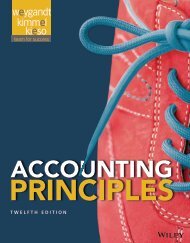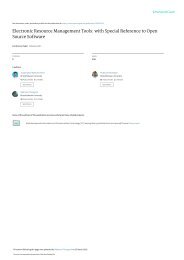Research Article for study 722
You also want an ePaper? Increase the reach of your titles
YUMPU automatically turns print PDFs into web optimized ePapers that Google loves.
other institutions; when, every day, in the EU an incredible amount of money is wasted,<br />
due to the impossibility of creating a genuine economic, monetary and fiscal union to run<br />
the single currency; in all these cases, it very much appears that politics would need<br />
some lessons on "how to get it right", as well.<br />
Panel discussion, moderated by Frances Robinson, WSJ<br />
Andreas Schleicher, Director, Directorate <strong>for</strong> Education, OECD/PISA financial literacy<br />
assessment of students (video message)<br />
We need to think of the ways to enhance financial literacy. Is it about the quality or<br />
quantity of teaching financial literacy? Do we need to teach it as a separate subject?<br />
Does it have to be an out-of-school experience?<br />
The out-of-school context seems to be closely related to the financial skills of young<br />
people. On average across OECD countries and economies, students who hold a bank<br />
account have better financial skills than students with similar socio-economic status who<br />
do not hold a bank account.<br />
When we look at the number of students who have the exposure to financial education,<br />
the link to financial literacy is not so obvious and clear. There seem to be other factors<br />
that play bigger role. The per<strong>for</strong>mance in mathematics used to be a better predictor <strong>for</strong><br />
the financial literacy skills than the volume of financial education.<br />
If we look at the financial education as a school curriculum, there are big differences<br />
across many countries. There are some countries where financial education is thought as<br />
a separate subject. We have to ask if there is an outcome in financial literacy. <strong>Research</strong><br />
shows that it is not always the case.<br />
Who teaches financial literacy? In the vast majority of countries, teachers play the<br />
predominant role. In some countries, people from the private or public sector, as well as<br />
from NGOs, are involved. However, in the majority of countries, teachers have the<br />
significant responsibility in financial education.<br />
Outcomes in financial capability among pupils in Europe vary considerably. Pupils in<br />
most EU countries included in the PISA lag behind their counterparts in obvious<br />
competitor countries in the Asia-Pacific region.<br />
Joanna Drake, SMEs and Entrepreneurship, DG ENTR, European Commission<br />
At Member State level, chambers of commerce and local business organisations are<br />
currently playing a major role in offering good training opportunities, especially <strong>for</strong> those<br />
entrepreneurs, owners of SMEs and micro-companies who cannot access or af<strong>for</strong>d<br />
organised training. In this regard, the role of banks and other financial institutions, as well<br />
as accountants and mutual-guarantee organisations, is also crucial.<br />
What we need is more and better synergies because entrepreneurial skills and financial<br />
skills go hand in hand.<br />
Evidence suggests that the smaller a firm is, the larger is the likelihood that its credit<br />
application might be declined. For this reason, smaller firms are also the ones where<br />
better in<strong>for</strong>mation is most required. Applicants tend to lack knowledge of the specificities<br />
of bank lending requirements which results in in<strong>for</strong>mation asymmetries: banks are unable<br />
to evaluate fully the risk and creditworthiness of clients as enterprises cannot grasp the<br />
contract terms and implications of credit evaluation procedures.<br />
We have some good examples where financial literacy is taken seriously, but they are still<br />
too few. Here I see a market gap which we as policy makers have to deal with.<br />
We need to define what we mean by financial literacy: is it about the sources of finance or<br />
about the actual financial skills.<br />
The role of financial institutions is particularly relevant here: they could play an important<br />
role in advising SMEs; especially those who were refused credit by signposting to them<br />
@ACCAViews





